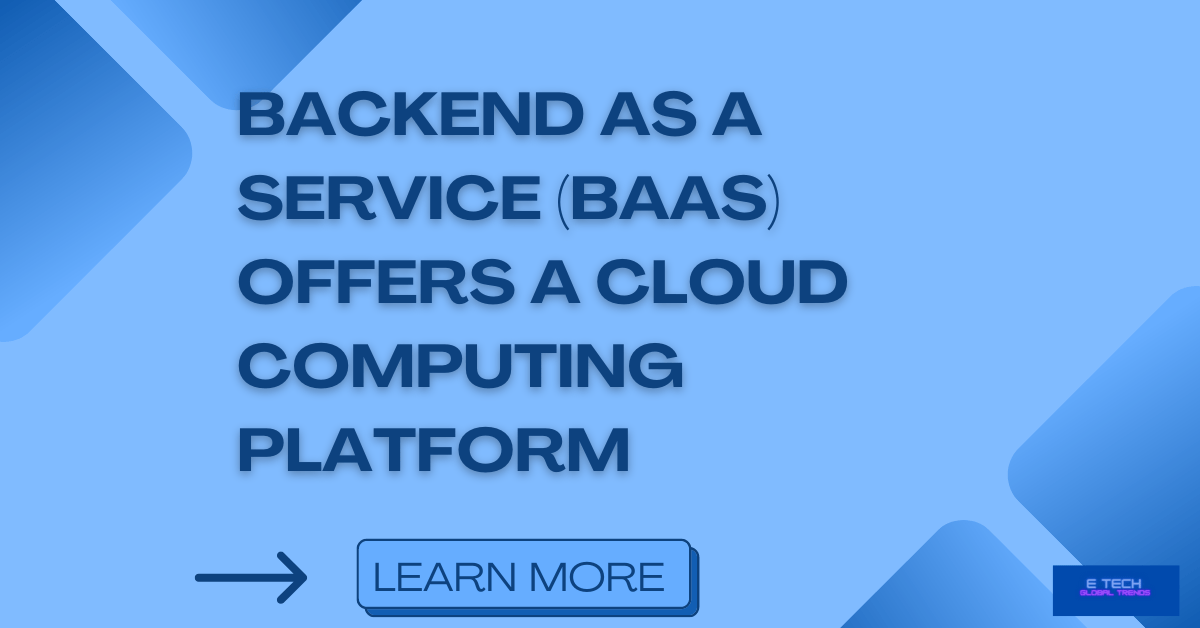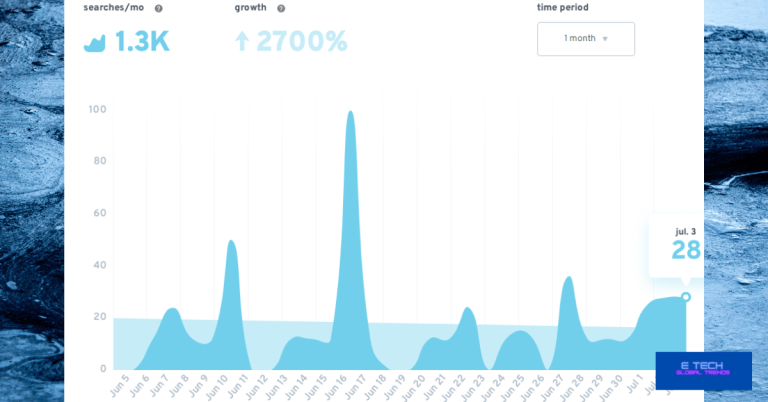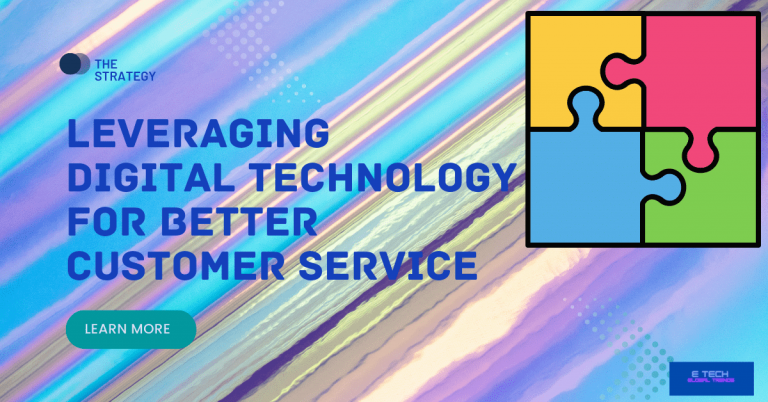Backend As A Service
Day by day there are plenty of new technological concepts appear, significantly. These innovations will look forward our task easier. If your business interests in this trend, this content is for you. Backend as a service (BaaS) offers a cloud computing service that gives developers a platform for creating and maintaining the backend of mobile as well as web apps.
What are the various cloud computing models?
Cloud computing may be classified into three types:
1.0 Infrastructure as a Service (IaaS)
This sort of cloud computing delivers infrastructure resources to customers through the internet, including virtualized IT equipment like servers, storage, and networking.
2.0 Platform as a Service (PaaS)
This particular type of cloud computing offers customers a platform for developing, running, and managing applications without having to worry about the infrastructure that underlies them.
3.0 Software as a Service (SaaS)
a form of cloud computing that distributes software programs to consumers through the internet on a subscription basis.
Function as a Service (FaaS) and Mobile Backend as a Service (MBaaS) are two variants of these primary categories of cloud computing.
What are the advantages of working as a back-end developer?
Server-side development is automated by a backend as a service platform, which also handles the underlying infrastructure. It allows for the outsourcing of infrastructure management and offers ready-to-use backend components, which are utilized by app developers to construct online and mobile apps.
Backend as a Service has the following major features.
- APIs and SDKs
- Cloud Storage
- Database
- Cloud Code Functions
- Authentication -Social Media, Email, etc
- Cloud-Based Hosting
- Notifications -Push Notifications, Email Notifications, etc
What are the advantages of Backend as a Service?
- Concentrate on the primary business
- Can develop fast
- Serverless computing environment
- Emphasis on user experience-UX
- Reduced development cos
- Reduced time to market
- A reduction in the number of backend engineers
- Capability to scale
- Offers managed service
- Efficiency
- Backups that are automated
- gives better security
- Adherence
- Absolute Infrastructure redundancy
The goal of discussing the qualities and benefits mentioned above is to answer the question.
of course, As a backend developer, you may guarantee that your app/website has solid backend development.
What are the most significant mobile app development technologies?
Mobile app development has grown to be one of the world’s most significant and fastest-growing industries.
To become successful in this industry, mobile app developers must master many crucial technologies.
So, Native application development is a crucial technology. Native apps are designed exclusively for a particular platform, like iOS and Android. Cross-platform or web-based programs often provide superior speed & a better user experience.
Mobile backend as a service (MBaaS)
This is another critical technology. MBaaS enables developers to quickly design and maintain backend functionalities for their mobile Apps.
such as user identification, storage, as well as data processing. Developers can save time and money by doing so.
Why is web development less common than the usage of Firebase for mobile app development?
A variety of services and tools are available for developers to use on the cloud-based platform Firebase as they create and deploy apps. Firebase is a tool that can use for both web development and mobile app development.
although for a few reasons,
it is frequently more closely connected with the latter.
of course, One reason for this is that Firebase offers a variety of capabilities that are very valuable for mobile app development, including;
- real-time databases,
- authentication, and
- even cloud messaging.
So, These characteristics are critical for mobile apps. because they enhance the user experience by providing;
- secure login,
- real-time updates, &
- push notifications.
Another reason why Firebase is popular during mobile app development is the fact it was created expressly for mobile app development by Google.
Firebase began as a platform for mobile backend-as-a-service (MBaaS), offering developers a quick and easy method to build up the backend infrastructures for mobile apps.
Firebase grew in capabilities and extended to accommodate online development, but its origins within mobile app development remain visible.
However, Firebase is also utilized in web development and may be an excellent alternative for developing online apps which need updates to data in real-time or push alerts.
Firebase offers a variety of web-centric capabilities which include;
- hosting,
- cloud functions, and
- analytics.
This makes it an excellent choice for web development in addition.
Finally, whether to utilize Firebase in mobile or web development is determined by the project’s requirements as well as the developer’s preferences & expertise.
So now, let’s discuss how to do this. These options you can try.
What is the most efficient approach to host an app’s backend?
The most effective app backend hosting alternatives, to clarify
A list of the finest solutions for hosting your application’s backend.
1.0 Firebase
Firebase is one of Google’s most popular platforms. Because this backend service supports such a large website.
Firebase quickly became one of the best and most trustworthy systems ever. With its low cost and abundance of capabilities.
therefore, Firebase is unquestionably a Mobile backend as a Service (mBaaS) that all users should test at least once in their lives.
Firebase’s drawbacks,
However, there are some drawbacks identified by the experts.
Sometimes, You may be aware of it.
1.0 Limitations of Firebase Realtime Database
Your main storage will most likely be the Realtime Database, which has benefits and drawbacks.
So, One of the major drawbacks is the restricted querying capabilities. There is no way to apply filters in real-time databases since the entire DB is a big JSON file, making complicated queries challenging.
Another item to consider is Firebase Realtime DB & its data modeling capabilities. The “database as a single file” format prevents the implementation of relationships between data elements.
To be impartial, these concerns are irrelevant when addressing Firestore DB, so long as it concentrates on more complicated data structures and supports more advanced querying.
As a result, users may opt to use it instead.
2.0 Vendor exclusivity
The problem with vendor lock-in is unrelated to Firebase as a service.
Generally speaking,
that is the problem with employing BaaS solutions. However, this might occur as a drawback.
because Firebase doesn’t provide any sort of migration tools for moving the data to another platform.
3.0 iOS app support is limited.
Even though Firebase is cross-platform, we tend to talk about it a lot more in terms of how it applies to Android.
When used for testing, Test Lab supports a large selection of Android devices and connects with Android Studio with ease. When it comes to iOS, the Test Lab group has just recently announced the start of restricted beta support for the platform, which comprises a minimal user interface and a few test devices.
Examining Firebase’s features can help you decide if it is a suitable match for your application.
A vendor is always chosen based on technology in a 50/50 ratio with reputation and trust accounting for the remaining 25%.
Therefore, you might research different market providers if you think Firebase has zero to give for your particular project.
2.0 AWS Amplify
Amplify is an AWS free-to-use backend as a service. The framework is tightly linked with AWS services and is an excellent tool for accelerating mobile app development.
AWS Amplify serves as a suite of services and tools provided by Amazon online Services. that enable developers to create and grow mobile and online apps.
Of course. it offers a wide range of services, including authentication, storage, & analytics.
3.0 Kinvey
Kinvey is a prominent platform that was purchased by Progress Software.
So, this solution has a plethora of capabilities that combine to make it one of the greatest and most helpful platforms for developing back-end as a Service.
Kinvey has a reputation as one of the greatest services for sophisticated developers and is frequently found on several website reviews.
4.0 Back4App
Back4App is one of the greatest comfortable and simple-to-use back-end software solutions for mobile platforms, as suggested by several expert websites.
Back4App is a top choice for many. because of its straightforward layout and a plethora of features which render it among the most appealing platforms for use right now.
5.0 Kumulos
Kumulos is a novel and Distinct Mobile Backend as a Service (DBaaS).
What distinguishes Kumulos from many other similar solutions is its extremely clean design and ability to function with practically every major mobile platform,
including Android and iOS.
6.0 Parse
Parse provides an open-source backend-as-a-service solution allowing developers to create and grow mobile and online apps.
It offers features like authentication, storage, & push alerts. exactly like other solutions
7.0 Graphcool
Developers may create and grow GraphQL-based web and mobile apps using the backend-as-a-service platform Graphcool.
It offers several services, including authentication, storage, & analytics.
8.0 Hasura
Developers can quickly create and expand online and mobile apps using Hasura, a real-time GraphQL backend. It offers several services, including authentication, storage, & analytics.
The above are only a handful of examples. there are other platforms that developers may use in place of Firebase to create, grow, and manage online and mobile apps.
9.0 Sashido
Look no further than SashiDo.io AP Development, Deployment, and Scaling made simple for an outstanding MBaaS solution.0 Amazing product, excellent customer service, and you can receive 45 days for free simply by signing up. A good deal.
More incredible app marketing tools, similarly, like localization plus A/B testing of push notifications, automated messaging, and app use data, will soon be made available by the Sashido team.
so pay attention!
Pricing begins at $4.95 per month.
- Conclusion for the list of solutions
To choose the one that best suits your unique use case and requirements, therefore, it’s critical to compare the features and costs of each service.
Let’s move on to a crucial point!
What is that?
Why should your company employ a cloud backend for the creation of apps?
In general, cloud BaaS may benefit enterprises by accelerating the process of developing apps, enhancing scalability and flexibility, enhancing security and compliance, decreasing expenses, and boosting efficiency.
For the creation of apps, companies should think about employing cloud backend as a service (BaaS) for many reasons.
How?
Let us explain in detail…
1 Cost and time savings during development:
Cloud BaaS services offer pre-built backend features that are simple to incorporate into your project, which may greatly save expenses and time during development.
Because of this, you can concentrate on developing your app’s front end and providing an improved user interface while leaving backend maintenance to the provider of cloud services.
Isn’t it nice?
2 Scalability plus flexibility
Cloud BaaS providers provide a scalable and flexible infrastructure capable of handling surges in traffic or user demand.
As a result, you can rapidly up or down the backend resources for your App following your demands.
without needing to be concerned about maintaining infrastructure or actual servers.
3 possibilities to integrate with other cloud services
Cloud BaaS providers frequently enable integration with additional cloud services like;
- analytics,
- storage, &
- messaging,
which can improve the usability and usefulness of your app.
This implies that you don’t have to worry about creating new services or features from the start when adding them to your App.
4 Security along with compliance
The data and user privacy in your app may protect with the comprehensive security measures offered by cloud BaaS providers.
which generally include; similarly
- encryption,
- authentication,
- as well as access limits.
They also often adhere to industry standards and laws like HIPAA or GDPR, which may assist you verify that your app complies with legal requirements.
Summary
To sum up, You have a variety of methods available to you for creating the backend even like React Native application.
By Using-
- Node.js and
- Express.js, a cloud-based backend-as-a-service (BaaS) infrastructure.
- either Firebase or
- AWS Amplify, or
- a framework like Django or Ruby on Rails
are some of the more well-liked options.
Finally, the decision will be based on your unique needs and preferences. The ideal alternative may be a BaaS platform if you’re searching for a quick and simple solution.
Using a framework like Node.js and Express.js might represent a better option. if you have more complicated requirements & want greater control over your backend.
Hope this content will be useful.
Cheers!
You can read more on related topics of ETECH content creators.
Mobile App development, become a full-stack developer, front-end developer, homepage design







